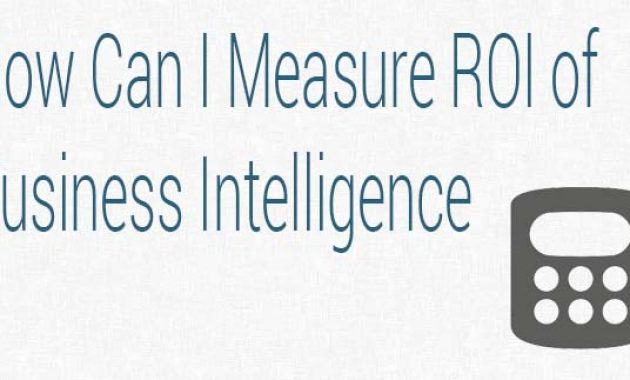
Unlocking Value: Business Intelligence Tools for High ROI
In today’s data-driven landscape, businesses are constantly seeking ways to gain a competitive edge. The ability to make informed decisions, based on real-time insights, is no longer a luxury but a necessity. This is where business intelligence (BI) tools come into play. These tools are designed to collect, analyze, and interpret data, transforming raw information into actionable intelligence. The ultimate goal? To achieve a high return on investment (ROI).
This article explores the world of business intelligence tools, focusing on how they can be leveraged to deliver a significant ROI. We will delve into the benefits, key features, and implementation strategies to help you make the most of these powerful resources.
The Power of Data-Driven Decisions
At the heart of effective business intelligence lies the ability to make data-driven decisions. Traditional methods of decision-making, often based on gut feelings or historical trends, can be unreliable and inefficient. Business intelligence tools provide a more scientific approach. They offer a comprehensive view of your business, allowing you to identify patterns, trends, and anomalies that might otherwise go unnoticed.
By analyzing data from various sources, such as sales, marketing, customer service, and operations, these tools provide a holistic view of your business performance. This allows you to:
- Identify areas for improvement.
- Optimize processes.
- Reduce costs.
- Increase revenue.
Ultimately, data-driven decisions lead to better outcomes and a higher ROI.
Key Benefits of Business Intelligence Tools
Investing in business intelligence tools offers a multitude of benefits, all contributing to a higher ROI. These benefits extend across various departments and functions within an organization.
Improved Decision-Making
As mentioned earlier, business intelligence tools empower decision-makers with the information they need to make informed choices. This leads to more effective strategies and better outcomes. With real-time data at your fingertips, you can quickly respond to changing market conditions and identify opportunities.
Enhanced Efficiency
Business intelligence tools automate many of the manual tasks associated with data analysis. This frees up your employees to focus on more strategic initiatives. By streamlining processes and eliminating bottlenecks, you can improve overall efficiency and productivity.
Increased Revenue
By identifying new market opportunities, optimizing pricing strategies, and improving sales performance, business intelligence tools can directly contribute to increased revenue. Understanding customer behavior and preferences allows you to tailor your products and services to meet their needs, leading to increased sales and customer loyalty.
Reduced Costs
Business intelligence tools can help you identify areas where you can reduce costs. By analyzing operational data, you can identify inefficiencies, optimize resource allocation, and reduce waste. This can lead to significant cost savings and improve your bottom line.
Competitive Advantage
In today’s competitive market, the ability to make data-driven decisions is a significant advantage. Business intelligence tools allow you to stay ahead of the curve, identify emerging trends, and respond to market changes more quickly than your competitors.
Essential Features of Effective Business Intelligence Tools
Not all business intelligence tools are created equal. To maximize your ROI, it’s important to choose tools that offer a comprehensive set of features. Some of the most important features include:
Data Integration
The ability to integrate data from various sources is crucial. Your business intelligence tool should be able to connect to databases, spreadsheets, cloud services, and other data sources, allowing you to create a unified view of your data.
Data Visualization
Data visualization tools transform complex data into easy-to-understand charts, graphs, and dashboards. This makes it easier to identify patterns, trends, and insights. A good visualization tool will allow you to customize your visualizations to meet your specific needs.
Reporting and Analysis
Robust reporting and analysis capabilities are essential. Your business intelligence tool should allow you to create custom reports, perform advanced analysis, and drill down into the details of your data. This enables you to identify the root causes of problems and make more informed decisions.
Data Mining
Data mining involves the process of discovering patterns, trends, and insights from large datasets. This allows you to uncover hidden opportunities and identify potential risks. Advanced data mining tools can help you predict future trends and make more proactive decisions.
Mobile Accessibility
In today’s mobile world, it’s important to have access to your data on the go. Your business intelligence tool should offer mobile accessibility, allowing you to view reports and dashboards from your smartphone or tablet.
Implementing Business Intelligence Tools for Maximum ROI
Implementing business intelligence tools is not a one-size-fits-all process. The specific steps you take will depend on your organization’s size, industry, and specific needs. However, there are some general best practices that can help you maximize your ROI.
Define Your Goals
Before you start implementing a business intelligence tool, it’s important to define your goals. What do you hope to achieve by using this tool? What specific questions do you want to answer? Having clear goals will help you select the right tool and measure your success.
Choose the Right Tools
There are many business intelligence tools available, each with its own strengths and weaknesses. Research the different options and choose the tool that best fits your needs. Consider factors such as ease of use, scalability, and cost.
Integrate Your Data
Once you’ve selected your tool, you’ll need to integrate your data. This involves connecting your tool to your various data sources and ensuring that the data is clean and accurate. This is a critical step, as the quality of your data will directly impact the quality of your insights.
Train Your Employees
Your employees will need training to use the business intelligence tool effectively. Provide them with the necessary training and support to ensure they can access and interpret the data. This will help them make better decisions and maximize the value of the tool.
Monitor and Evaluate
Once the tool is implemented, it’s important to monitor its performance and evaluate its effectiveness. Track key metrics, such as the number of reports generated, the number of decisions made based on the data, and the impact on your bottom line. This will help you identify areas for improvement and ensure that you’re getting a good ROI.
Examples of Business Intelligence Tools Delivering High ROI
Numerous companies have successfully leveraged business intelligence tools to achieve a high ROI. Here are a few examples:
Salesforce
Salesforce, a leading cloud-based software company, uses its own business intelligence tools to track sales performance, identify customer trends, and improve customer satisfaction. This has helped them increase sales, reduce churn, and improve customer loyalty.
Amazon
Amazon uses business intelligence tools to analyze customer behavior, personalize product recommendations, and optimize its supply chain. This has helped them increase sales, reduce costs, and improve customer satisfaction.
Netflix
Netflix uses business intelligence tools to analyze viewing habits, personalize content recommendations, and optimize its content library. This has helped them increase subscriber engagement, reduce churn, and improve customer satisfaction.
Conclusion: The Future of Business Intelligence
Business intelligence tools are essential for businesses that want to thrive in today’s data-driven world. By leveraging these tools, companies can make more informed decisions, optimize their operations, and achieve a higher ROI. As technology continues to evolve, the capabilities of business intelligence tools will only continue to grow, making them an even more critical asset for businesses of all sizes. Embracing these tools is not just about staying competitive; it’s about securing your future success. [See also: How BI Tools Transform Businesses]
Investing in the right business intelligence tools, coupled with a well-defined strategy and skilled implementation, can unlock significant value and drive a high ROI. The path to data-driven success begins with the right tools and a commitment to leveraging the power of information.

